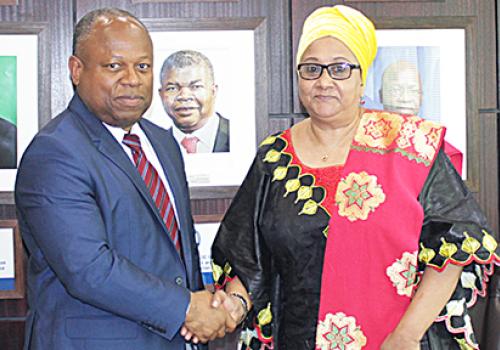The Southern African Development Community (SADC) Executive Secretary, Her Excellency, Dr. Stergomena Lawrence Tax met with the Chief Executive Officer of Africa50, Mr. Alain Ebobissé at the SADC Secretariat Head office in Gaborone, Botswana on 5th April 2018. The two parties discussed innovative ways of financing infrastructure through the Africa50 Fund. Mr. Ebobissé pointed out that the Africa50 Fund is a new financing instrument created to complement the African Development Bank’s own infrastructure investment funding, and has set targets to help close the huge infrastructure financing gap in Africa. He further indicated that Africa50 operates commercially, focussing on Private and PPP projects to catalyse more investments in Africa. “We support commercially viable projects and development projects which are aimed at increasing the number of investment-ready, "bankable" infrastructure projects, and provide project finance through Africa50.” he mentioned.
Through the SADC Secretariat, Africa50 aims to foster a close relationship with SADC Member States’ Public and Private Sectors, alluring them to assume country shareholder membership and to capitalise the Fund for infrastructure development, and utilise the available infrastructure development resources and facilities. The Executive Secretary of SADC, H.E., Dr. Tax mentioned that, SADC is open to new strategies and welcomes new cooperating partners in the quest to advance the region’s infrastructure development and industrialisation. She further indicated that these sectors are key to unlocking trade, industrial development, and thus growth and development across the SADC region. She also stated that the Secretariat will engage its Members States’ Public and Private Sectors further, and open dialogue to share the concept as well as mutual benefits associated with the Africa50 Fund.
Africa50’s primary target sectors are transport and power, which represent almost 70% of projected infrastructure investment needs between now and 2025, and have a significant economic and transformative impact.

